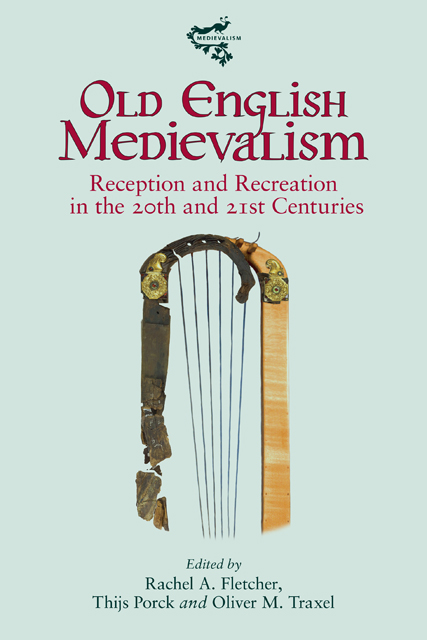Book contents
- Frontmatter
- Contents
- List of Illustrations
- List of Contributors
- Acknowledgements
- List of Abbreviations
- Early Medieval English in the Modern Age: An Introduction to Old English Medievalism
- I Reinventing, Reimagining and Recontextualizing Old English Poetry
- II Invoking Early Medieval England and Its Language in Historical Fiction
- III Translating and Composing in Neo-Old English
- IV Approaching Old English and Neo-Old English in the Classroom
- Bibliography
- Index
- Medievalism
1 - Old English as a Playground for Poets? W. H. Auden, Christopher Patton and Jeramy Dodds
Published online by Cambridge University Press: 17 December 2022
- Frontmatter
- Contents
- List of Illustrations
- List of Contributors
- Acknowledgements
- List of Abbreviations
- Early Medieval English in the Modern Age: An Introduction to Old English Medievalism
- I Reinventing, Reimagining and Recontextualizing Old English Poetry
- II Invoking Early Medieval England and Its Language in Historical Fiction
- III Translating and Composing in Neo-Old English
- IV Approaching Old English and Neo-Old English in the Classroom
- Bibliography
- Index
- Medievalism
Summary
Poets often like arcane knowledge, hidden byways, odd detours, new ways of seeing the world. Their work, after all, is to see things anew themselves and somehow in their poetry to shock or entice us, their interlocutors, to see things anew ourselves. They use language to inspire and enlighten, to intrigue and engage. Sometimes they do so to teach their audience or expound their views on a political, social or cultural issue; sometimes they do so to delight or engage the heart and soul; and sometimes they do so simply to provide a thing of beauty or a surprise. To do this work they need inspiration and enlightenment themselves. For some poets, beginning with figures such as Alfred, Lord Tennyson, Henry Wadsworth Longfellow, and Walt Whitman, Old English has formed some part of that inspiration. A poet’s access to Old English is sometimes secondhand, or mediated in various ways, and sometimes firsthand, generally through undergraduate study or some other specific learning opportunity. There, however, matters become somewhat complicated: knowledge of Old English is generally reserved not just for university-level students of English literature but for a small subset of that group ‒ those who choose to take courses in the earliest language and literature of the field. Thus, even students of English often turn aside from a course or program in which they essentially learn a new language. This means that references to Old English are arcane even to many students of English today. Demonstrating detailed knowledge of the literature and language of early medieval England is, therefore, a kind of secret understanding, a world of material that is just beyond accessibility even for those who are well acquainted with English literature, a kind of otherworldly reach for the poet to know and the poet’s audience to admire. In the one hundred and fifty years since serious university-level study of English literature as a scholarly field began, various poets have engaged with this material, from Tennyson and Longfellow to Jorge Luis Borges, from Richard Wilbur to Earle Birney, from Basil Bunting to Geoffrey Hill to Seamus Heaney, and from my chosen poets here, W. H. Auden to Christopher Patton and Jeramy Dodds.
For some of these poets, working with Old English is about establishing their roots, becoming aware of the origins of English poetry, and engaging with issues of nationalism and ethnicity.
- Type
- Chapter
- Information
- Old English MedievalismReception and Recreation in the 20th and 21st Centuries, pp. 19 - 36Publisher: Boydell & BrewerPrint publication year: 2022



